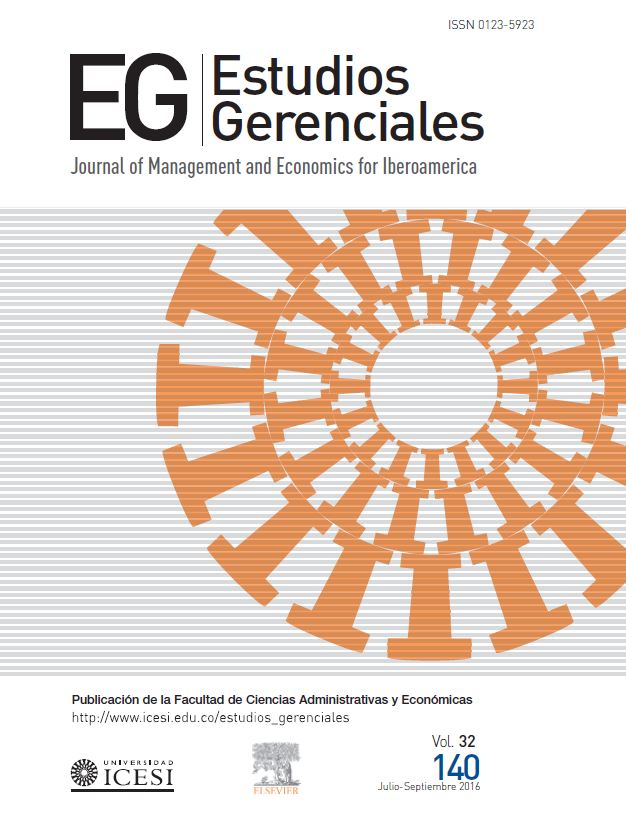EMCEL, ¿cómo ejecutar una buena recuperación del servicio?
DOI:
https://doi.org/10.1016/j.estger.2016.09.001Palabras clave:
Servicio, Recuperación del servicio, Satisfacción del cliente, Paradoja de recuperación, Servicio al clienteResumen
El presente caso de estudio tiene como objetivo mostrarle al lector una situación problemática de falla de un servicio e inducir al debate acerca de las distintas formas de responder correctamente a la falla de un servicio. A través de un caso de estudio basado en una situación real en la cual una empresa comete un error en la prestación de un servicio y a su vez inicia el proceso de recuperación del mismo, de fidelización del cliente y de reparación de su reputación organizacional, se pretenden mostrar distintas maneras de recuperación del servicio y brindar una orientación y recomendación en torno a cómo construir confianza con el cliente y reparar la reputación de la organización. La principal conclusión es que en un escenario caracterizado por una menor diferenciación entre productos, dados sus niveles de calidad y desempeño tan similares, el servicio se convierte en el elemento que verdaderamente agrega valor, porque es allí donde radica la diferencia que hace más atractiva una oferta frente a las demás.
Descargas
Referencias
Conlon, D. E. y Murray, N. M. (1996). Customer perceptions of corporate responses to product complaints: The role of explanations. Academy of Management Journal, 39(4), 1040–1056.
Elsbach, K. D. (1994). Managing organizational legitimacy in the California cattle industry: The construction and effectiveness of verbal accounts. Administrative Science Quarterly, 39(1), 57–88.
Elsbach, K. D., Sutton, R. I. y Principe, K. E. (1998). Averting expected challenges through anticipatory impression management: A study of hospital billing. Organization Science, 9(1), 68–86.
Etzel, M. J. y Silverman, B. I. (1981). A managerial perspective on directions for retail customer dissatisfaction research. Journal of Retailing, 57(3), 124–136.
Fay, J. E. (1995). Service recovery: Doing it right the second time. Training, 27, 42–48.
Goodwin, C. y Ross, I. (1992). Consumer responses to service failures: Influence of procedural and interactional fairness perceptions. Journal of Business Research, 25(2), 149–163.
Gronroos, C. (1988). Service quality: The six criteria of good perceived service. Review of Business, 9(3), 10–13.
Jones, C. (2007). Understanding service recovery satisfaction from a service encounter perspective: A pilot study. South African Journal of Business Management, 38(2), 41–51.
Lateef, F. (2011). Patient expectations and the paradigm shift of care in emergency medicine. Journal of Emergencies, Trauma, and Shock, 4(2), 163–167.
Levesque, T. J. y McDougall, G. H. G. (2000). Service problems and recovery strategies: An experiment. Canadian Journal of Administrative Sciences/Revue Canadienne des Sciences de l'Administration, 17(1), 20–37.
Lovelock, C., Patterson, P. y Wirtz, J. (2015). Services Marketing. Pearson Education Australia.
Mattila, A. S. (2006). The power of explanations in mitigating the ill-effects of service failures. Journal of Services Marketing, 20(7), 422–428.
McCollough, M. A. y Bharadwaj, S. G. (1992). The Recovery Paradox: An examination of consumer satisfaction in relation to disconfirmation, service quality, and attribution based theories. En C. T. Allen y T. J. Madden (Eds.), Marketing Theory and Applications (p. 119). Chicago: American Marketing Association.
Miller, J. L., Craighead, C. W. y Karwan, K. R. (2000). Service recovery: A framework and empirical investigation. Journal of Operations Management, 18(4), 387–400.
Roschk, H. y Gelbrich, K. (2014). Identifying appropriate compensation types for service failures. A meta-analytic and experimental analysis. Journal of Service Research, 17(2), 195–211.
Silke, B. S. y Landisoa Eunorphie, R. (2015). Service recovery for moderate and high involvement services. Journal of Services Marketing, 29(5), 331–343.
Wirtz, J. y Mattila, A. S. (2004). Consumer responses to compensation, speed of recovery and apology after a service failure. International Journal of Service Industry Management, 15(2), 150–166.
Zeithaml, V. A., Parasuraman, A. y Berry, L. L. (1985). Problems and strategies in services marketing. The Journal of Marketing, 49(2), 33–46.
Publicado
Número
Sección
Licencia
Los autores de artículos serán responsables de los mismos, y por tal no comprometen los principios o políticas de la Universidad Icesi ni las del Comité Editorial de la revista Estudios Gerenciales. Los autores autorizan y aceptan la cesión de todos los derechos a la revista Estudios Gerenciales, tanto en su publicación impresa como electrónica. Luego de publicado el artículo, puede ser reproducido sin autorización, mencionando autor(es), título, año, volumen, número y rango de páginas de la publicación, y como fuente: Estudios Gerenciales (abstenerse de usar Revista Estudios Gerenciales).








